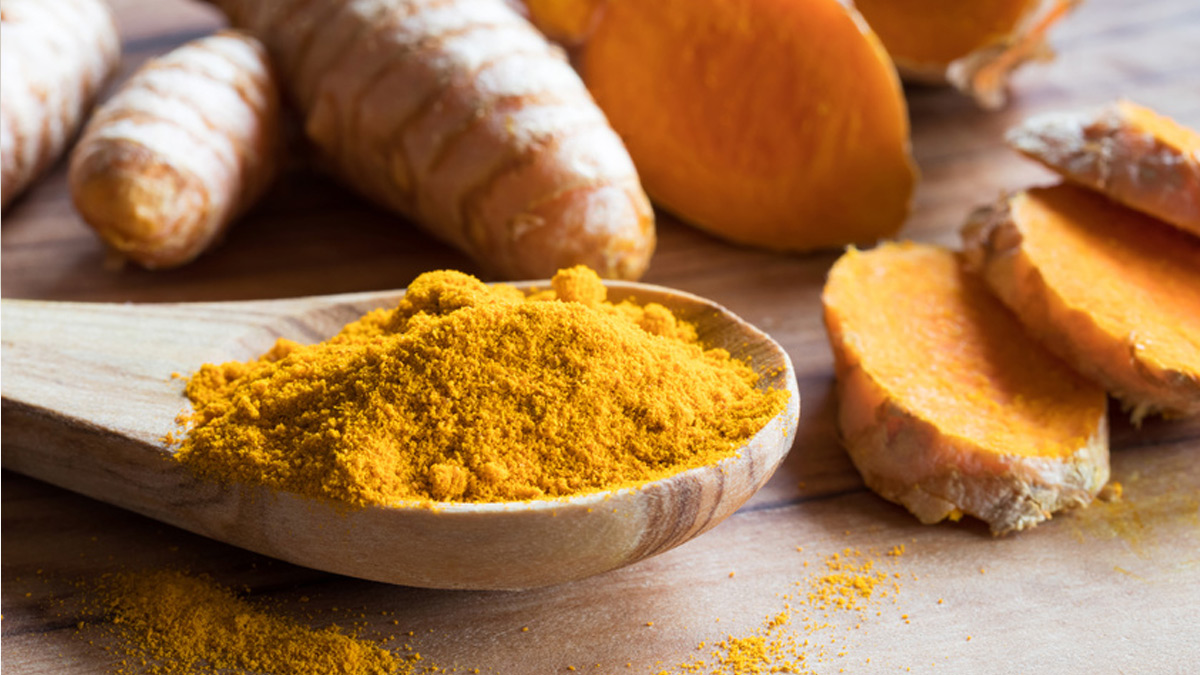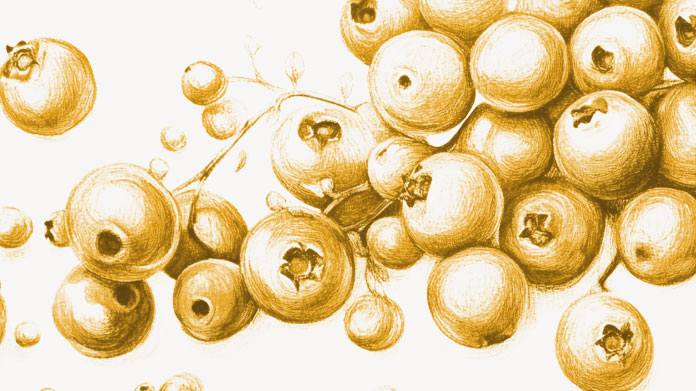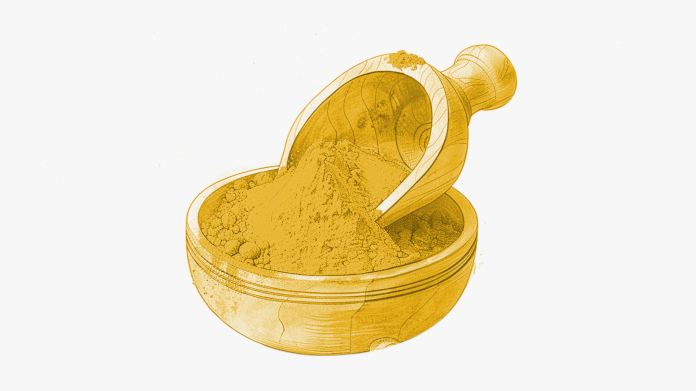Turmeric and Curcumin: properties and benefits
Turmeric, or curcuma as it’s sometimes known, is not just a popular spice, but also an active phytotherapy ingredient which has been used for hundreds of years...

What exactly is turmeric, or turmeric powder?
Native to India and Malaysia, turmeric (Curcuma longa) is a herbaceous perennial belonging to the Zingiberaceae family . It has long, green leaves and can produce multiple flowers. However, its value lies in its underground stems or rhizomes. These are harvested to produce the famous turmeric powder, which has for centuries been used in a variety of ways.
What are its main applications?
Also known as ‘Indian saffron’, or haridra in Sanskrit, turmeric powder is often associated with its use as a culinary spice. Its hot, peppery taste is particularly useful for adding flavor to stews and sauces (vegetable or Colombo curries…). Its intense yellow/orange colour also makes it an excellent food colouring.
Apart from in cooking, turmeric powder has many other uses, including as a natural yellow/orange dye. It is also an important ingredient in traditional systems of medicine. In Ayurveda, for example, it is used in the preparation of powerful natural remedies such as the renowned Ayurvedic supplement Maharishi Amrit Kalash®, traditionally used to promote longevity.
Scientific progress has meant that turmeric’s therapeutic properties have now been confirmed by a number of studies. This medicinal plant is today considered abenchmark ingredient in phytotherapy and is used in the development of many natural dietary supplements.
What is turmeric’s composition?
The reason turmeric has been used therapeutically for so many years is its exceptional composition in active principles. Scientific studies have led to the identification of powerful compounds called curcuminoids, the best-known of which is curcumin. As well as being responsible for turmeric’s bright colour, this natural pigment has a number of therapeutic properties. In particular, researchers believe it has several protective effects, as described in the following paragraph.
What are turmeric’s properties?
Turmeric’s curcumin content gives it numerous therapeutic properties. Though not exhaustive, the following section provides an overview of these properties.
Antioxidant power. Turmeric has been called the ‘spice of longevity’ due to the antioxidant potential of curcumin. This pigment is able to combat oxidative stress, or more specifically, the accumulation of free radicals which is known to promote aging. Curcumin has therefore been the subject of numerous studies into the prevention of age-related diseases. Today, it is frequently the focus of research, and features in the composition of several anti-aging supplements. The product AntiOxidant Synergy, for example, combines an extract of Curcuma Longa with eleven other natural antioxidants, including resveratrol from grapes, EGCG from green tea and glutathione.
Anti-inflammatory action. A number of scientists have investigated turmeric’s potential benefits in combatting acute and chronic inflammation. Their work has shown that curcumin acts as a natural anti-inflammatory in the body, able to fight the process of inflammation by inhibiting the secretion of several pro-inflammatory substances. Widely-documented, this anti-inflammatory effect has led to the development of specific products such as the dietary supplement InflaRelief Formula. This contains a number of substances including an extract of Curcuma longa standardized to 95% curcuminoids.
Benefits for digestion. In Asia, turmeric is recognized for its beneficial effects on digestion. It promotes the secretion and elimination of bile, the fluid produced by the liver which plays a role in the digestive process.
Hypolipidaemic and cardio-protective effects. Did you know that bile also plays a key role in the digestion of lipids? By promoting its secretion, turmeric therefore offers significant hypolipidaemic potential. In other words, in certain cases, it may help prevent hyperlipidaemia, known to be a major risk factor for cardiovascular disease.
Liver-protective benefits. In helping to eliminate bile from the body, turmeric is also associated with hepato-protective effects – it supports the activity and cleansing of the liver.
What are the benefits offered by turmeric?
Given all these properties, turmeric offers numerous benefits for our health and well-being. Though not exhaustive, the paragraphs below summarise its main virtues and therapeutic applications.
Digestive problems. Turmeric has been used for many years to improve digestive health. It is widely recommended for relieving dyspepsia, a term which covers a collection of problems related to digestive function, including stomach aches, nausea, bloating, feelings of heaviness and loss of appetite.
Inflammatory bowel disease. As a natural and powerful anti-inflammatory, turmeric is attracting considerable interest for its potential in the control of acute and chronic inflammation. A number of studies have already produced positive results, particularly in patients suffering from inflammatory bowel disorders such as gastritis, ulcerative colitis and Crohn’s disease …).
Joint pain. Turmeric has also been scientifically shown to relieve inflammation-induced joint pain, particularly that related to arthritis.
Benefits for the skin. The latest research findings suggest that turmeric could also offer benefits for treating inflammatory skin conditions such as eczema.
Cardiovascular disease. Some specialists are convinced of turmeric’s cardio-protective effects. As a result of its antioxidant potency, it helps protect the cardiovascular system from free radical damage, while its hypolipidaemic effect plays a part in preventing the accumulation of fat in the arteries. Turmeric may thus play a role in preventing a number of cardiovascular problems.
Cancer. Turmeric is also considered a promising ingredient for the prevention and care of certain types of cancer. While large-scale clinical studies are required to confirm this potential, current scientific data shows that curcumin may act against cancer cell development. It may be effective at fighting colon, breast, lung, prostate and stomach cancer. Epidemiological studies seem to support this theory: incidence of cancer in Asian countries, with higher consumption of turmeric, is lower than in the West.
How should you consume turmeric?
Turmeric can be consumed in one of two ways: in powder form or in extracts standardized in curcuminoids. The powder can be added to a variety of dishes though it must be said that quality can be a major problem. Not all commercially-available turmeric powder is of the same quality nor has the same composition. In contrast, extracts standardized in curcuminoids have, by definition, a stable composition; they are formulated to provide an optimal content in active principles. In other words, maximum benefit can be gained from turmeric’s effects. Offering optimal efficacy, extracts of Curcuma longa are now available which are standardized to contain 95% curcuminoids. These are used in the dietary supplements sold by SuperSmart, such as the product Natural Curcuma.
How should turmeric supplements be taken?
Specialists generally recommend taking turmeric supplements with food. In terms of the recommended dose, this depends both on the curcumin content of the supplement and on individual needs. If in doubt, seek advice from your therapist who will be able to guide you in your choice of supplements. In this regard, did you know that turmeric supplements can be combined with other dietary supplements? For example, SuperSmart offers a ‘joint health’ combination pack of Flexi Smart and Super Curcuma.
Are there any contraindications?
At recommended doses, turmeric has few contraindications and is safe to consume for most people. However, given its action in the liver, turmeric is contraindicated in those suffering from gallstones and medical advice should also be sought by anyone with liver disease. And lastly, as a precautionary measure, turmeric supplements are not recommended for pregnant women, breastfeeding mothers, or young children.
Keywords
1 Days
First bottle has been finished
First bottle has been finished. 2 bottles remaining for 3 month time frame trial as recommended
CORCORAN Pamela
6 Days
repeat customer
recommended by my doctor. easy to create an account. Discounts and specials are appreciated. packaging and delivery is dependable. Capsules easy to digest. I've had some some capsules and tablets that are broken inside their bottles.
Kokee
10 Days
Order was shipped on time and packaged…Wonderful Jobs!
Order was shipped on time and packaged excellently.
DMHoge
17 Days
great products and prices
great products and prices
Marie
22 Days
Easy to navigate site
Easy to navigate site, had what I was searching for, good price. easy order-check out
James Tucker
29 Days
My skin is clearing up nicely!
Pretty good for my skin so far.
Christian
31 Days
The new packaging is excellent
The new packaging is excellent - finally! No more squashed boxes and torn envelopes.
GORAN
32 Days
Great Product
Great Product
Larry Garrett
36 Days
Quick shipping
Quick shipping; good price. No issues!
Mary McCarty
37 Days
Thr product is very good and is helping…
Thr product is very good and is helping me on my health. Then is always on time
LUGO Luz
40 Days
Buying was fine
Buying was fine. I had problems with the website not recognizing my login info, and had to call to get it fixed. Other than that, everything was good.
David S. Clark
40 Days
Your super maca and super ginseng are…phenomenal
Your super maca and super ginseng are phenomenal supplements that compliment each other when taking them together. Fantastic feeling of well-being and lots of mid day energy without the crash.
Keith Mason
43 Days
I have had amazing results with every…
I have had amazing results with every supplement I've purchased. I am extremely satisfied with this company
kirstin Torres
43 Days
Fine products
Fine products . They are on the leading edge of online supplements. The only issue -so far-is they sometime run out of subscription items.
Jason Argos
46 Days
The ordering process is very user…
The ordering process is very user friendly and the products always come in a timely manner.
CARTER Rhonda




